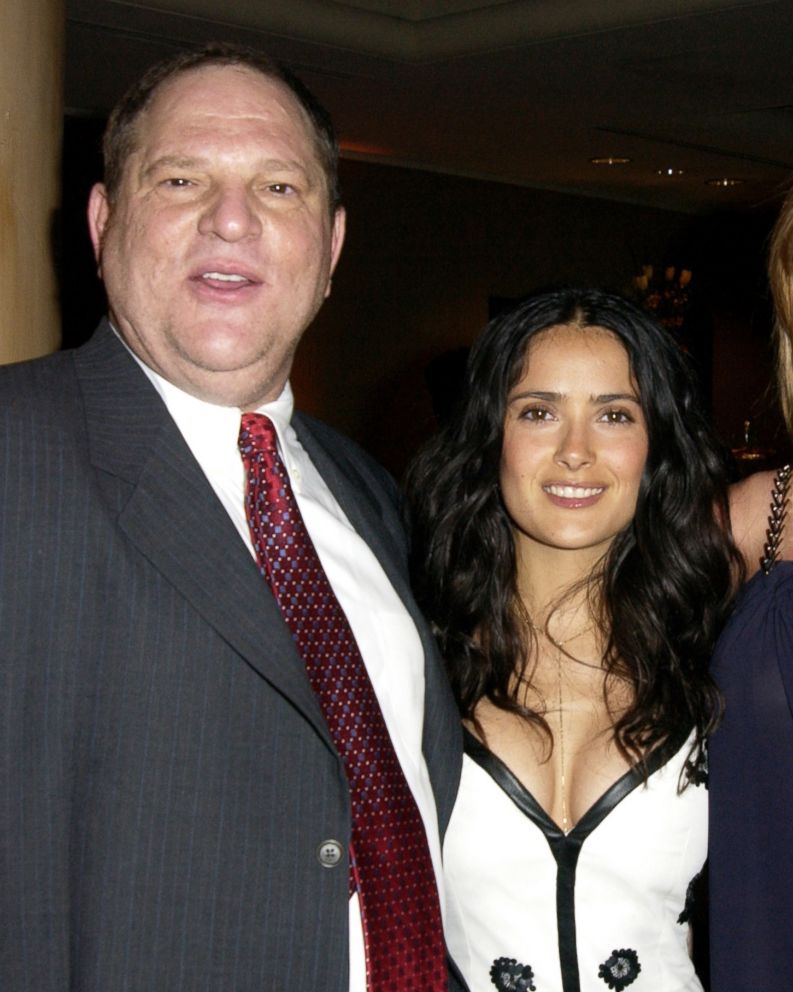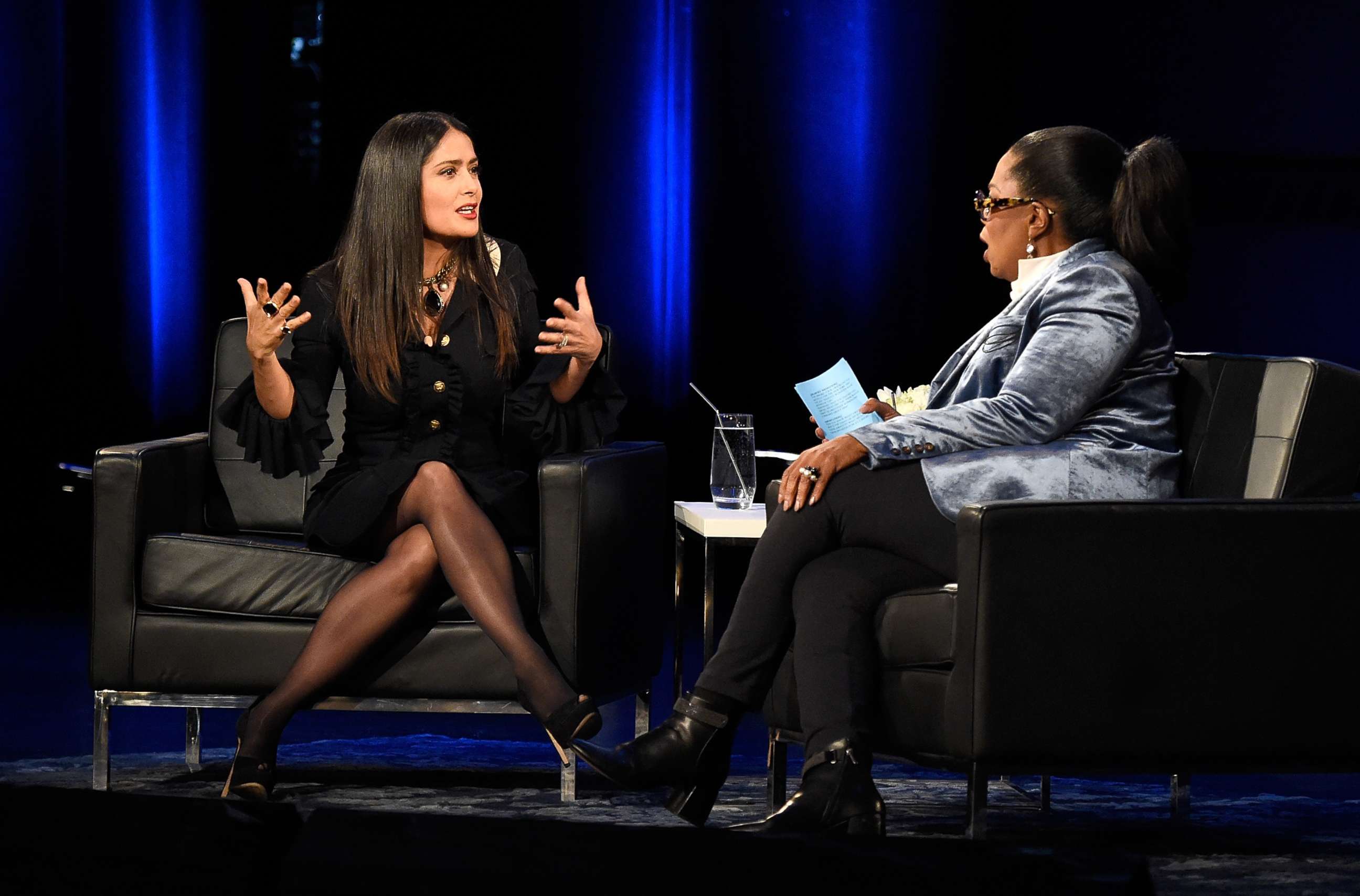Salma Hayek explains why she waited to speak on Harvey Weinstein allegations: 'He had a lot of respect for me'
"He had a lot of respect for me... I was able to let go," the actress said.
— -- Salma Hayek explained why she waited nearly two months to open up about her own troubling experiences with the now disgraced producer Harvey Weinstein.
The Oscar-nominated actress and #MeToo co-founder was one of the many featured guests during "Oprah's Super Soul Conversations" held Wednesday at New York City's famed Apollo Theater.
The live event, which also featured sit-down interviews with Oscar-nominated director Jordan Peele, late night talk show hosts Stephen Colbert and Trevor Noah, "Grown-ish" star Yara Shahidi and Lin-Manuel Miranda, will air on OWN Feb. 27. It'll also be available on Oprah Winfrey's podcast.
The 51-year-old actress told Winfrey that the New York Times reached out to her to be part of the original Weinstein report, which was released in October.

"I ended up not doing it," she said. "I felt ashamed that I was a coward. I've been working and supporting women for two decades... and then I was a coward."
Hayek said that she had forgiven Weinstein, which is part of the reason why she waited so long to come forward with her own story.
"Harvey, he had a lot of respect for me. Throughout the years that man looked up to me and he had a lot of respect. I earned it with blood. But he did. I was able to let go and move on," she explained.
Hayek noted that she also hesitated because she hadn't told her husband what happened between her and Weinstein and she "thought of all these different things including my child, I didn't want to talk about it."
Eventually, however, Hayek penned an op-ed in December for the New York Times where she detailed Weinstein's alleged continual harassment, which began after Weinstein's former company Miramax produced "Frida," Hayek's 2002 film about famed Mexican artist Frida Kahlo, which she produced and starred in.
The only reason why this is working right now, it's not only because... we spoke out, but it's also because everybody listened.
Hayek wrote that Weinstein would show up at her door "at all hours of the night, hotel after hotel, location after location." She claimed that he repeatedly propositioned her to take a shower with him or let him watch her take a shower, give him a massage or let him give her oral sex, and more inappropriate behavior.
A statement released by Weinstein after Hayek's initial New York Times editorial -- read, "All of the sexual allegations as portrayed by Salma are not accurate and others who witnessed the events have a different account of what transpired."

"Mr. Weinstein regards Salma Hayek as a first-class actress and cast her in several of his movies, among them 'Once Upon a Time in Mexico,' 'Dogma,' and 'Studio 54,'" the statement continued. "He was very proud of her Best Actress Academy Award nomination for 'Frida' and continues to support her work."
Onstage Wednesday, Hayek claimed that Weinstein told "Frida's" director Julie Taymor that he's "going to break the kneecaps of that c---."
Weinstein's attorney denied her claim that he called Hayek the c-word in a statement Thursday when asked by ABC News to respond to her latest remarks. The following statement was sent to ABC by Weinstein's attorney:
"As in most collaborative projects, there was creative friction on 'Frida,' and in this case, it served to drive the project to perfection. It wasn’t an easy process and Mr. Weinstein apologizes for the way he may have approached the situation. He hopes all involved can at least agree that the movie was fantastic. Mr. Weinstein apologizes for his boorish behavior following a screening of 'Frida;' prompted by his disappointment in the cut of the movie -- and a reason he took a firm hand in the final edit. However, his conflict was with Julie Taymor not Ms. Hayek. Mr. Weinstein never fought with Ms. Hayek on set and this comment does not reflect how he feels about her; he doesn’t recall ever saying such an awful thing."

"Nevertheless, Mr. Weinstein deeply apologizes to Ms. Hayek for any pain she has suffered as a result of his behavior or comments. Mr. Weinstein has great respect for her as an actress and a producer and thinks there are many more “Frida’s” for her to produce in the future and that she doesn’t need anyone to help her -- She’s terrific by herself," the statement concluded.
Hayek told Winfrey she became "depressed" and "paranoid" after working with Weinstein.
"Once you enter this dynamic, it's really, really hard... you don't see the way out. There always is a way out," she added.
Hayek, who is one of the many women in Hollywood involved in the launch of the #MeToo movement, said she doesn't think women speaking out against sexual harassment and sexual assault is a "moment."
"I think that sometimes we underestimate our efforts -- everybody's efforts -- and the power that it has for change," she told Winfrey. "The only reason why this is working right now, it's not only because... we spoke out, but it's also because everybody listened."




